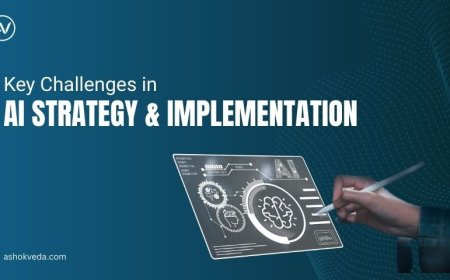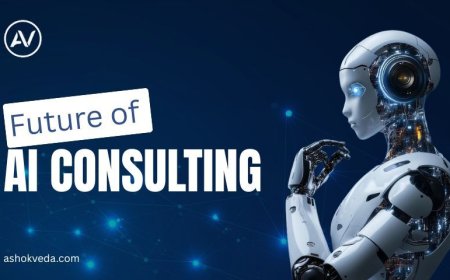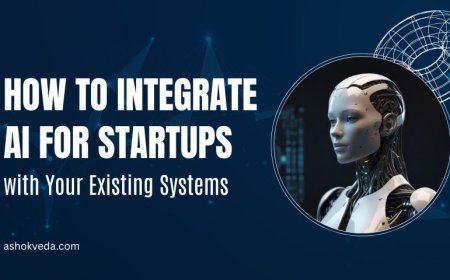Unlocking Potential with Custom AI Consulting Solutions
Explore the power of custom solutions in AI consulting. Learn how tailored AI strategies can drive business innovation, improve efficiency, and provide a competitive edge.
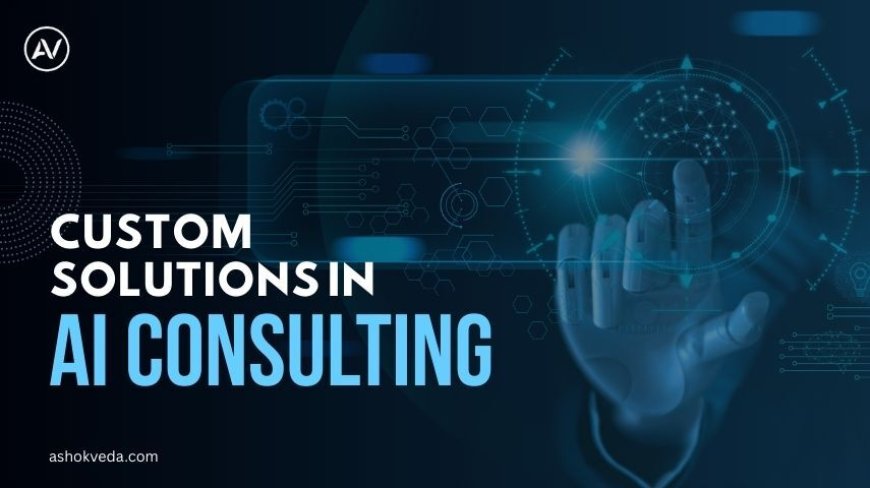
As businesses continue to embrace the digital age, the need for efficient, tailored solutions has never been more critical. Artificial Intelligence (AI) has emerged as a powerful tool for transforming industries, from healthcare to finance, manufacturing, and retail. However, implementing AI successfully requires more than just adopting off-the-shelf solutions—it requires custom solutions in AI consulting that align with a business’s unique needs and goals.
The global AI consulting market is growing rapidly, projected to reach $60 billion by 2027. Yet, as the demand for AI services expands, the need for customized solutions becomes increasingly important. A one-size-fits-all approach to AI rarely yields the desired results. This is where AI consultants step in to create tailored, scalable, and effective solutions that maximize the potential of AI for businesses. Dive deep into the importance of custom AI solutions, the components that make them successful, the challenges businesses face when implementing them, and how they can transform your business operations. Let's explore how personalized AI consulting can help organizations achieve their goals and set them apart in an increasingly competitive landscape.
What Are Custom Solutions in AI Consulting?
Custom solutions in AI consulting refer to tailor-made strategies and technologies designed to address the unique needs of a business. Unlike off-the-shelf AI tools that provide generic functionalities, custom AI solutions are built to align with a company's specific goals, data sets, and operational requirements.
These solutions leverage a variety of AI technologies, including machine learning, natural language processing (NLP), computer vision, and robotics, to create systems that not only function effectively but also provide a competitive edge by solving unique business challenges.
The Value of Custom AI Solutions
Why are custom solutions so valuable? The main reasons include:
-
Business-Specific Objectives: Custom solutions are designed to tackle particular business problems or enhance existing workflows, ensuring that AI investments align with business goals.
-
Better Integration: Custom AI solutions integrate seamlessly with an organization’s existing infrastructure, whether it’s customer relationship management (CRM) software, enterprise resource planning (ERP) systems, or data pipelines.
-
Scalability: Tailored AI systems are built to scale with the business as it grows, accommodating more data, more processes, and new functionalities without disrupting existing operations.
-
Cost-Effectiveness: Instead of investing in a broad, off-the-shelf solution that includes unnecessary features, businesses can focus on paying only for the tools and systems that meet their exact requirements, optimizing both the initial cost and long-term ROI.
Key Components of Custom AI Solutions
Custom AI solutions are made up of various components that work together to solve specific business challenges. Here are the key building blocks of successful custom AI systems:
1. Data Collection and Preparation
AI models require high-quality data to function properly. One of the first steps in building a custom AI solution is gathering relevant data from internal systems, databases, and external sources. The data is then cleaned, preprocessed, and structured to ensure it’s ready for use in machine learning models.
2. Model Development
Once the data is ready, AI consultants design and build machine learning models or algorithms tailored to the business needs. Whether the goal is to predict customer behavior, optimize supply chains, or detect fraud, the right algorithms are chosen to match the task. Common machine learning methods include supervised learning, unsupervised learning, and reinforcement learning.
3. System Integration
Custom AI solutions must be able to integrate seamlessly with the company’s existing IT infrastructure. This involves linking AI models to current databases, business applications, and other tools that the company already uses. This integration ensures that data flows smoothly between systems and that AI solutions complement existing workflows.
4. Testing and Validation
Before deployment, the AI model undergoes rigorous testing to ensure that it performs well in real-world scenarios. Testing includes evaluating the accuracy of the model, verifying that it generates the expected outputs, and ensuring that it scales efficiently with growing data.
5. Deployment and Monitoring
Once the AI model is validated, it is deployed into the business environment. However, the work doesn’t stop there. Continuous monitoring is necessary to track the performance of the system, ensure its accuracy, and address any potential issues that may arise post-deployment.
Challenges in Custom AI Solutions Implementation
While custom AI solutions offer significant advantages, businesses may face several challenges during the implementation process:
1. Data Quality and Availability
AI relies on vast amounts of quality data to make accurate predictions. However, businesses often struggle with poor data quality, incomplete datasets, or data that is spread across disparate systems. Cleaning, normalizing, and organizing this data for AI models is a time-consuming and often complex process.
2. Integration with Legacy Systems
Many businesses are still reliant on legacy systems that weren’t designed to work with modern AI technologies. Integrating custom AI solutions with these outdated systems can be challenging, requiring the development of custom interfaces or middleware to ensure compatibility.
3. Cost of Development
Developing custom AI solutions can be resource-intensive, requiring a team of skilled data scientists, engineers, and consultants. The cost of development varies depending on the complexity of the solution, the technology stack, and the scope of the project. Smaller businesses may find this initial investment difficult, although the long-term benefits often justify the cost.
4. Talent Shortage
AI expertise is in high demand but short supply. Companies may face difficulty hiring the right talent or may need to train existing employees to handle the complexities of AI systems.
5. Ethical Considerations
With great power comes great responsibility. Custom AI solutions must be developed with ethical considerations in mind, particularly regarding data privacy, algorithmic bias, and transparency. Ensuring that AI models operate ethically is a critical aspect of implementation.
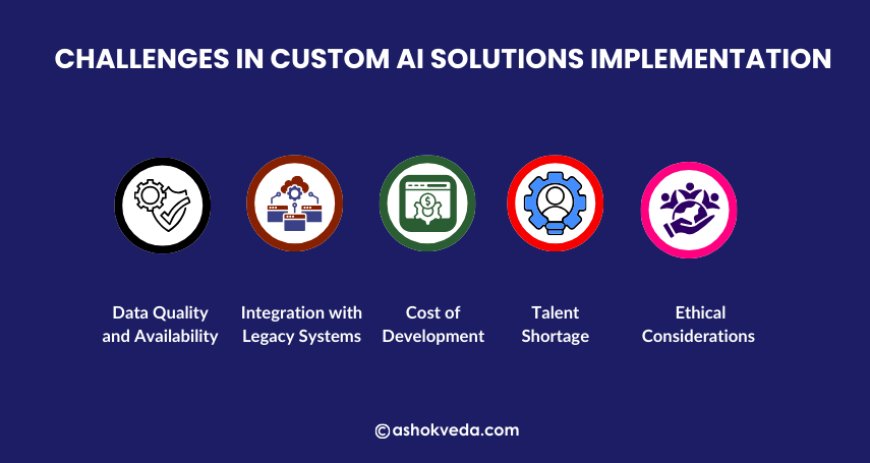
Industries Benefiting from Custom AI Solutions
Custom AI solutions are transforming industries by addressing specific challenges and unlocking new opportunities. Here’s how different sectors are benefiting from AI consulting:
1. Healthcare
In healthcare, AI is used to personalize patient care, predict diseases, and automate administrative tasks. Custom solutions can analyze medical images, monitor patient vitals, and suggest treatment plans based on individual needs. For example, AI can assist in predicting patient outcomes and optimizing treatment protocols for better results.
2. Retail
AI in retail enhances customer experience and operational efficiency. Personalized recommendation systems, demand forecasting, inventory management, and dynamic pricing are just a few of the custom AI solutions used to drive sales and reduce costs in retail businesses.
3. Finance
Custom AI solutions in finance enable real-time fraud detection, algorithmic trading, and customer service automation. AI models can analyze transaction data to detect unusual behavior, helping financial institutions prevent fraud and improve compliance.
4. Manufacturing
Predictive maintenance powered by AI ensures that machinery operates smoothly, preventing costly breakdowns and unplanned downtime. Custom AI solutions are also used to optimize production schedules, streamline supply chains, and enhance quality control.
5. Automotive
AI solutions in the automotive industry are revolutionizing autonomous vehicles, predictive maintenance, and smart navigation systems. Custom solutions allow manufacturers to fine-tune AI models that suit specific vehicle models or geographic locations, improving safety and driving experience.
The Future of Custom AI Solutions
The future of custom AI solutions is incredibly promising, with several emerging trends shaping the scenario:
1. AI Explainability
As AI systems become more complex, ensuring that these systems are explainable to humans is critical. This trend focuses on making AI decisions transparent and understandable to non-technical stakeholders, which helps build trust in AI solutions.
2. Edge AI
Edge computing refers to processing data locally on devices rather than sending it to centralized servers. As AI models are deployed on edge devices, businesses will be able to process data faster, reduce latency, and make real-time decisions without relying on cloud infrastructure.
3. AI for Automation
AI is already playing a crucial role in automating routine tasks, but its capabilities are expected to expand. Businesses will increasingly rely on AI to handle more complex tasks, from advanced data analysis to customer service interactions and business strategy optimization.
4. AI Ethics and Governance
As AI becomes more integrated into business processes, ensuring its ethical use will be paramount. AI governance frameworks will evolve to ensure that AI solutions are deployed responsibly, with consideration for fairness, transparency, and accountability.
Custom solutions in AI consulting are paving the way for businesses to unlock the full potential of artificial intelligence. By leveraging bespoke AI strategies, businesses can solve unique challenges, streamline operations, and achieve a competitive edge. While the implementation of custom AI solutions presents challenges—such as data quality, integration complexity, and talent shortages—the long-term benefits far outweigh the obstacles. As AI continues to evolve, the demand for customized solutions will grow. Businesses that invest in tailored AI consulting services will be better positioned to thrive in the future. By embracing custom AI solutions, organizations can drive innovation, enhance operational efficiency, and stay ahead of the curve in an increasingly AI-driven world.

























